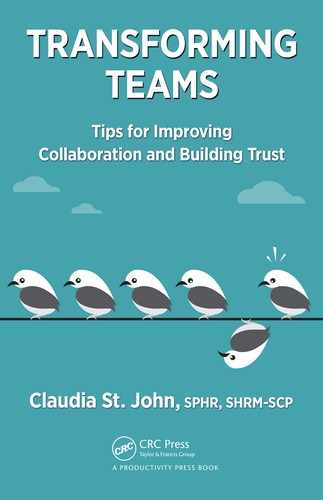150 ◾ Transforming Teams
“Yes, it is, Keisha. But when you raised your hand
saying that you wanted to be held accountable, did you
mean it?” asked Karen.
“Yes, absolutely.”
“Well, I’m pretty certain everyone else in this room
did, too. So if you meant it when you raised your hand,
then it’s up to you to build your relationships by man-
aging your promises, holding yourself and your peers
accountable, and avoiding fake consensus. And guess
what?” Karen asked as she turned to the whiteboard
and circled back to Eliza’s golden nugget:
Be the change you seek!
* * *
The rest of the day consisted of the teams break-
ing into small groups to practice making promises,
managing promises, holding each other accountable,
and avoiding fake consensus. Clearly, holding others
accountable and avoiding fake consensus required some
practice and caused participants the most concern.
“I’m just not sure I can do this,” offered Jessica, the
customer service representative. “I’m a high S, and this
really makes me uncomfortable.”
Eliza stepped forward. “It clearly makes everyone
uncomfortable, which is why everyone in the room is
struggling with this. But let me ask you this: before we
had our session with Charles Henry, do you think you
could have talked to Dave about his dominance or to
Kirby about his need for control?” she asked.
“No, I guess not,” said Jessica.
Managing Promises ◾ 151
“That’s right. Because before we had the language
of the DISC, we didn’t have the tools to talk to each
other about something as touchy as their ‘personal-
ity’ or their ‘need for control’ or their ‘high sense of
urgency.’ Am I right?”
“Yes, you’re right,” said Jessica.
“Well, then, why is this different?” asked Eliza. “We
now have some additional language. Going forward, I
want to hear, in the halls of HDS, people talking about
‘conditions of satisfaction’ and ‘promises’ and ‘provider
versus consumer.’”
“That doesn’t concern me so much,” said Keisha,
jumping into the conversation. “But I just know holding
peers accountable is going to be hard. And, speaking
my mind, I’m not used to doing that.”
“Keisha, I know it is hard—harder for some than
for others. But my point is this: why can’t we also talk
about peer accountability and consensus?” Eliza asked.
“Here, let’s practice. Let’s pretend I’m holding you
accountable, okay?”
Keisha shyly accepted.
“Okay, Keisha, can we talk?” role-played Eliza.
“Sure,” said Keisha.
“Keisha, can we chat about a peer accountability
issue?”
“Sure.”
“Okay, you said you would have the Open Item
report to me by this morning, and I don’t have it. Do
you need to revise your promise? Can you still get it to
me and, if so, by when?”
152 ◾ Transforming Teams
“But that was easy! It was you doing it! It’s different
when I have to do it,” protested Keisha.
“Well then, you try.”
Keisha thought for a minute, cleared her throat, and
said, “Eliza, can I talk with you about a peer account-
ability issue?” She was shaking ever so slightly.
“Absolutely, Keisha, what’s up?”
“You said you were going to sign my tuition reimburse-
ment form from last semester, and you haven’t. I can’t
enroll this semester until last semester is paid. Do you
think you can sign it, and if so, by when?” asked Keisha.
The room went silent.
It was clear that Keisha had raised a very real, very
personal, and clearly very difcult request with Eliza.
And she had done it perfectly.
“Wow, Keisha. That was amazing.” Eliza’s response
lifted some of the tension that was building in the group,
but the participants remained silent. “Yes, I’m sorry I
didn’t keep that promise. I will have it to you by 9:00
tomorrow morning once we are back in the ofce.”
Eliza paused. “How did that feel, Keisha?”
“Actually, that was easy. Somehow, having some
words around peer accountability made it less personal.
That wasn’t hard at all. Even in front of all of you!” she
said, turning to the group.
The silence ended as the room erupted in applause.
“Way to go, Keisha!” shouted Dave as she self-con-
sciously took her seat.
Everyone knew that if Keisha could raise this issue
with Eliza in front of the group and have it go well,
then this was something even the most introverted,
Managing Promises ◾ 153
conict-averse person in the company could do. The team
now had some real tools to work with. What they had
was a new language to help them collaborate together.
* * *
It had been a long day. The group had worked very
hard. They were all ready to have a beverage together,
unwind, and celebrate their accomplishments. At the
restaurant bar, Eliza, had one more thing she needed to
accomplish. After everyone had ordered a drink and had
relaxed for about an hour, Eliza approached Claire and
asked her to join her outside for a private conversation.
Claire, clearly in a good mood, was happy to join her.
Once outside, Eliza told Claire how proud she was
of Claire and of her team. “What Keisha accomplished
in there was nothing short of miraculous. You must be
really pleased.”
“I am,” offered Claire. “And I’m excited for myself
because now I have some better tools to use with Dave
and Kirby. I’m just really excited to put this into action.”
“That’s great! I can’t wait to see how it works. Claire,”
Eliza continued. “I have never really been much of a
mentor to you, Dave, and Kirby. I think I’ve been focus-
ing on other aspects of my job, and maybe I haven’t
been doing as great a job as I could at giving you some
of the tools that were given to me along the way.
“My hope is that the DISC work and the trust work
today will start to provide some of the tools that we
could all use. But I’m dedicated now to sharing some of
the really important, simple lessons that were taught to
me along the way.”

154 ◾ Transforming Teams
Claire nodded as she listened to Eliza.
“Today, at lunch, I observed you interacting with
your team. It’s clear that they rely on you for a lot, and
in listening to the advice you gave them, I have to say
that I agreed with your judgment in all the answers you
provided.”
Claire was visibly pleased with this.
“And I want to say that now, as part of your develop-
ment and theirs, I would like you to put the burden back
on them to think through some of the solutions and
alternatives before they present the problems to you.
“One of my mentors once told me, ‘Never come to
me with a problem without also bringing three possible
solutions.’ It was great advice. My mentor would no lon-
ger let me dump a problem on his lap. I had to think
through the solutions rst and then present the alterna-
tives along with the problem.”
“Sounds like another golden nugget,” chuckled Claire.
“Yes, I guess it does,” smiled Eliza.
Bring three
solutions with
your problem
..................Content has been hidden....................
You can't read the all page of ebook, please click here login for view all page.
